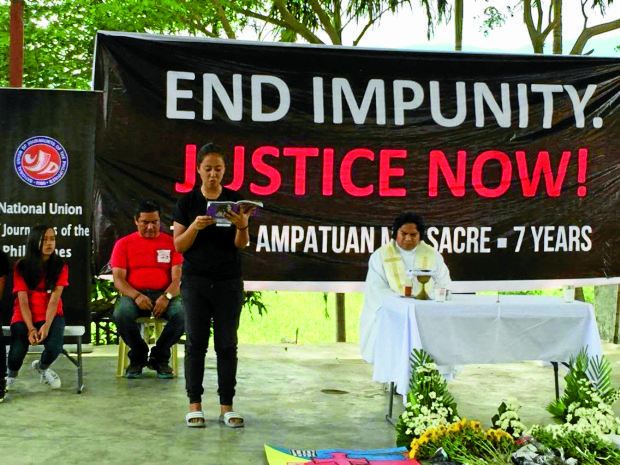Maguindanao massacre victims’ kin seek Duterte help

CALL FOR JUSTICE Relatives of victims of the 2009 Maguindanao massacre led by Fr. Rey Carvyn Ondap, executive
director of Passionist Center for Justice, Peace and Integrity of Creation in the Philippines, blame the judiciary for allowing the
culprits to mock the law, thus delaying the delivery of justice, in a memorial Mass. —JULIE S. ALIPALA
(Last of three parts)
AMPATUAN, MAGUINDANAO—Frustrated but still hopeful.
This is the general sentiment of relatives of the 58 people, including 32 journalists, who died in the Maguindanao massacre seven years ago.
At a gathering in Buluan town on Friday, the relatives of the victims said they were frustrated with the glacial pace of the cases filed against the accused led by members of the Ampatuan clan.
Most of the victims, riding in a convoy of vehicles, were on their way to Shariff Aguak town on Nov. 23, 2009, to file the certificate of candidacy of then Buluan Vice Mayor Esmael Mangudadatu, who was running for governor, when armed men blocked their path on the highway. The armed men took them to the interior village of Salman here and mowed them down with automatic gunfire.
Article continues after this advertisementFive of the victims were just passers-by.
Article continues after this advertisementThe armed men were led by then Datu Unsay Mayor Andal Ampatuan Jr., now in jail while facing trial.
Also jailed were former Autonomous Region in Muslim Mindanao Gov. Zaldy Ampatuan and the clan’s patriarch, former Maguindanao Gov. Andal Sr., who died from liver illness in detention last year.
So frustrating
“It is so frustrating. We want justice now,” said Karen Arantta, wife of journalist Henry Araneta.
Emily Lopez, cousin of journalist Arturo Betia, said it had been seven years since the massacre but justice remained out of sight.
Lopez said then President Benigno Aquino III failed to make good his promise of a conviction during his term.
Aquino used the massacre as a campaign issue when he ran for Malacañang in 2010.
“We (relatives of the victims) even met with him in Malacañang, where he promised us that there would be conviction before his term ended,” Lopez said.
“Nothing happened to that promise,” she said.
Now the relatives are calling on President Duterte to help them.
Other relatives said they agreed with Mr. Duterte’s campaign against drugs and corruption, but they wished he would use everything in his power to give them justice.
“The massacre was a result of greed for power and corruption of the Ampatuans,” Lopez said, adding that Mr. Duterte could order Justice Secretary Vitaliano Aguirre II to do everything to speed up the resolution of the case.
The relatives want an audience with the President “so we can tell him what we want,” Araneta said.
Maguindanao Gov. Esmael Mangudadatu, whose wife, two sisters and supporters, were killed in the massacre, said he had passed the relatives’ request to presidential aide Bong Go.
Slow trial expected
“I think that message was already relayed to the President, because days later, the President instructed Secretary Aguirre to focus on the case,” Mangudadatu told the Inquirer.
Mangudadatu, however, said that as much as he wanted justice, he was not frustrated at the slow pace of the trial.
“I expected this to drag on,” he said. “But my wish is to get a conviction in the next three years.”
He said even his children expected the long judicial process.
“One of my children even told me that she wanted to be a lawyer so she could help in the case,” he said.
Based on the status report on the case provided by lawyer Nena Santos, there were intentional delays employed by the defense.
“The delays in the trial proceedings are mostly on the account of the defense side. Reasons—no witness, lacks judicial affidavits, other accused opposing the testimony of their coaccused that are fatal to their defense. Changing of lawyers also caused the delay,” Santos said in her report.
“The motion for reconsideration of Andal Ampatuan Jr. to present additional witnesses for his bail petition after several postponements and final order to present his witnesses delayed the ruling of the court on his bail petition. This is exasperating for the families of the victims, intentional delay employed by the defense counsel,” Santos said.
Culture of impunity
Autonomous Region in Muslim Mindanao (ARMM) Gov. Mujiv Hataman told the Inquirer that he was not forgetting the bloody incident of 2009 that tarnished the region’s image.
“Seven years ago, 58 people were killed in what has become one of the darkest days in our history. Seven years and yet the wheels of justice have hardly moved for our people, especially for the victims of [the] massacre,” Hataman said.
“Every year it continues to speak volumes about the culture of impunity. The delivery of justice is endlessly stalled by motions filed against either defense or the prosecution, matched only by the relentless spirit of the families who are steadfast in their faith in our courts,” he added.